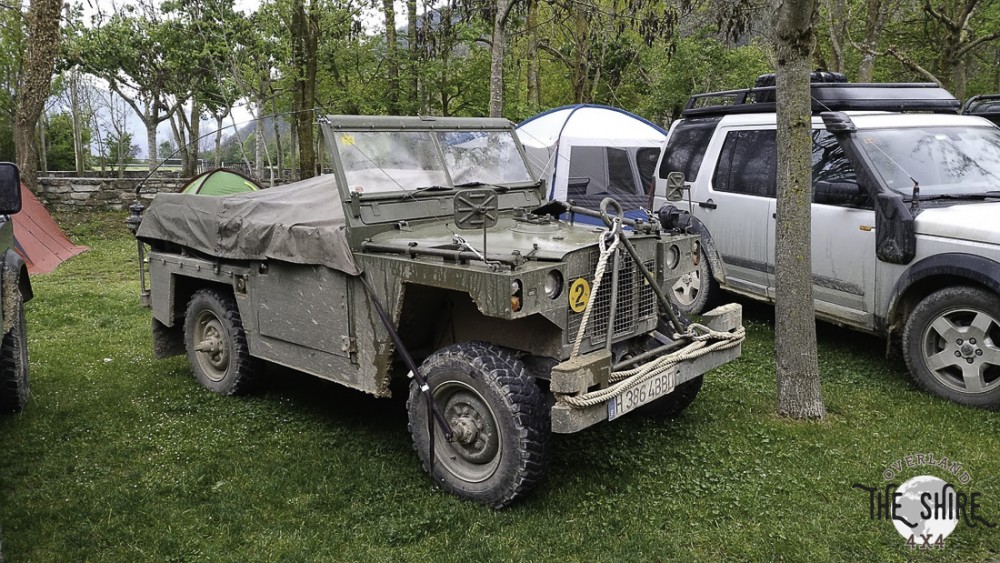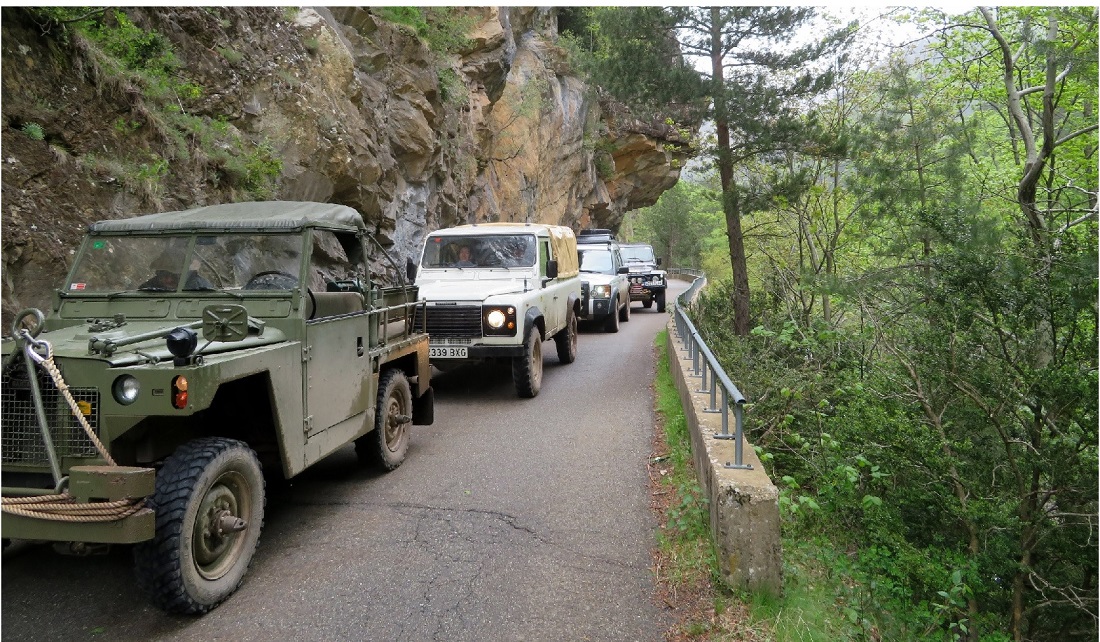
Different Types of Overland Trips
In one of the first entries of this blog, we already discussed the term overland. What is Overland? (I´ll leave the link here). On that occasion, we already explained what we should understand by an Overland trip. I encourage you to take a look before continuing with this entry.
As a brief summary and with the sole purpose of focusing on the topic, we established the following as defining elements of an overland trip:
- Land travel
- Covering long distances
- Done in a vehicle
Based on these three basic characteristics and the definition given in the previous entry, we will now see how many types of overland trips we could find.
The main characteristic that leads us to talk about different types of overland trips is the vehicle we use. Thus, depending on the type of vehicle we take, we will talk about one type of overland trip or another.
Before talking about the types of vehicles, I must remind you that, as we already mentioned in that blog entry, for us, an additional characteristic that must also be present in a trip to be defined as overland is the off-road component. We argue that to have a true overland trip, it must have a significant percentage of its route off-road.
However, in this entry, we will present the different types of vehicles we can use on this type of trip without focusing exclusively on off-road vehicles.
Types or Ways of Making an Overland Trip
As we have said, the main difference between one type and another will be established based on the type of vehicle used.
1.- Truck
Trucks specifically camperized and adapted for off-road driving are the first type of vehicle that comes to mind when thinking about an overland trip. In my case, specifically, my mind leads me to think of a 6x6 all-terrain truck, perfectly adapted for all types of terrain. A truck similar to those that run the Dakar Rally, saving all distances, of course.
The main advantage in the case of trucks is space. They provide enough space and comfort for several occupants and all necessary equipment. They could be the perfect alternative for a family or group of 4 or more members. It could be said that in our imagination, they would position themselves as the first option to choose an overland vehicle.
However, when it comes to choosing a vehicle for our trip, we must bear in mind that trucks also present a number of disadvantages. In fact, as we will see, all vehicles have their advantages and disadvantages. We must therefore be clear about what type of trip we are considering before choosing which vehicle to use. Or, if we already have the vehicle, what type of trip it allows us to make.
In the case of trucks, their disadvantages stem from their size. Yes, precisely their main advantage can also be their main source of problems. We must be clear about the type of trip we are going to make, the type of terrain we are going to traverse, and the topography we have to cross, as despite being very capable vehicles, they may not be the most suitable in those circumstances. For example, I would not take a truck if I were to travel through the Alps. There are many areas where the passage of a truck is practically impossible. In addition, in certain situations, reversing or maneuvering can be really impossible.
It could be the right vehicle for places where, without major topographic obstacles, we encounter wide unpaved roads, such as many areas of Africa, Asia, and even America.
Another disadvantage, directly related to its size, is its cost. The economic cost of a truck of this type is considerable at the time of purchase, in its camperization and adaptation, and in the day-to-day of the trip.
A 4x4 truck is a great alternative, its main advantage being its size, as well as its main disadvantage. We must be very clear about the route we are going to take and whether the truck is the most suitable vehicle.
2. Motorcycle
The motorcycle is at the opposite end of the spectrum from the truck. The main characteristic of the motorcycle is its versatility, agility and, for me, above all, its direct contact with the terrain, the places we pass through, and even the people.
Like with the truck, its main advantage is its size, which gives it great versatility, agility and flexibility. With the appropriate motorcycle, we can travel almost any type of track, over any kind of terrain and, even, a good number of paths and trails that no other type of vehicle can even dream of passing.
Sure! Here´s the translation:
"Su principal inconveniente, nos llega también por su tamaño, desde el punto de vista camper, de comodidad e incluso de confort la moto nos ofrece muy poca cosa, por no decir que no nos aporta nada.
Por el contrario, su costo es mucho menor tanto a la hora de la compra del vehículo de su adaptación, así como durante el viaje resulta todo mucho más económico

3.- Vehículo Todo Terreno (Coche)
I´ll start by saying that in our opinion, the best alternative for an overland trip is a four-wheel drive vehicle. With a four-wheel drive vehicle, we can go almost anywhere. It´s true that it doesn´t offer the versatility and agility of a motorcycle, although it comes close, and in terms of comfort for camping, it far surpasses it. It doesn´t offer the comfort of a truck, but it also doesn´t have its major drawbacks.
With a four-wheel drive car, we don´t have the extreme advantages of the previous vehicles, but we also don´t encounter their most important drawbacks. Therefore, in our opinion, it would be the ideal vehicle for most overland trips.
A regular car, that is not a four-wheel drive, in case our trip does not have a great off-road component, on the contrary, does not seem like a good option to us. It´s an option, of course, but in my opinion, it doesn´t offer the advantages of vans or RVs.
In terms of economic cost, we would also be in between the two previous poles, and it can vary greatly depending on the vehicle we choose and the preparation we make."
4. Camper Vans or Motorhomes
Motorhomes or camper vans can offer us the advantages of trucks, space, comfort, and convenience, although without the off-road component.
Regarding camper vans, they come in various sizes, and their advantages or disadvantages will be directly linked to their size.
In both cases, the type of trip we are going to take will be on paved roads or good dirt roads. In this case, we should keep in mind what type of trip we want to make, as depending on the size, we may or may not be able to enter certain towns or even park in certain areas.
As for the economic cost, we must take into account that the range of possibilities is almost infinite. We can start from a second-hand van with a lot of history behind it, with a more or less complete or demanding camperization, up to a true luxury vehicle. Therefore, the economic cost is the one we set for ourselves or the one we can face almost without limits.
To conclude this type, I wanted to mention off-road vans or vans, which depending on their size and mechanical characteristics, we would understand them included either in the section of trucks or in the section of off-road vehicles.
5. Bicycle
Yes, of course, we can also make an overland trip by bicycle, why not. After all, they are also vehicles, right?
Bicycles are an excellent way to make an overland trip. It´s free, it doesn´t pollute, and it´s slow enough to really get to know a country, without any rush of course.
Their main disadvantage could be their slowness in certain circumstances or types of terrain, which can be demoralizing. In a vast plain on a straight road where you can´t even see the next curve, it can wear on anyone´s nerves. In any case, they have a versatility that the previous vehicles do not offer, as we can shorten distances by using public transportation, for example, by boarding a train.
We can say that bicycles have characteristics of both vehicle and foot travel, but foot travel, due to the lack of a vehicle, would not be a type of overland travel and therefore falls outside the scope of this blog.
Public Transportation (Trains, Buses, Taxis, Tuk-tuks, etc...)
Simply as a closing remark for this post, I would like to point out that, in my opinion, using public transportation or collective means of transportation for a journey would not be considered an overland journey.
While it is true that we use vehicles to move from one place to another, it is not the way to undertake an overland journey. In an overland journey, we use a vehicle, we drive it, we handle it ourselves. The vehicle, whatever it may be, is an essential part of our journey, a part of ourselves traveling. It is our home, our companion, it is so much a part of us that we even name it.
The use of public transportation is a way of traveling, of course, but it is not an overland journey. It would be a way of tourism, of taking a tourist trip. On the contrary, the overland journey is not tourism, it is a way of traveling, of exploring, it is a way of life. A philosophy of life, if you will. The overlander is an overlander, not a tourist.